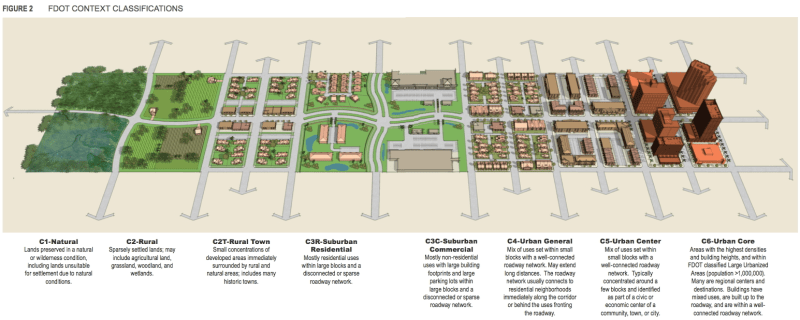America has done a lousy job of creating a safe transportation system for walking and biking -- and no state has botched it worse than Florida.
But to their credit, some officials at the Florida Department of Transportation are grappling with how to reduce the carnage. And if Florida can reform its streets and roads, any state can.
In an encouraging development, FDOT has formalized the idea that in urban areas, roads should be designed differently than in rural places. Chris McCahill and Rayla Bellis at the State Smart Transportation Initiative report on the agency's state "context-based street design":
As part of its Complete Streets Implementation, the Florida Department of Transportation (FDOT) recently adopted eight context classifications to guide road design decisions. Under this new system, planners and engineers will consider existing and future characteristics such as land uses, building configuration, and street connectivity to ensure that roads are designed for the right vehicle speeds, road users, and trip types.
This new approach acknowledges that state roads often serve important local needs, such as when they run through town centers. According to FDOT, “the context classification provides an important layer of information that complements functional classification in determining the transportation demand characteristics along a roadway, including typical users, trip length, and vehicular travel speeds.” These classifications help determine whether an arterial roadway might need accommodations for pedestrians, bicycles, and transit users and whether it should have on-street parking, for example.
FDOT’s State Complete Streets Program Manager Dewayne Carver notes that “FDOT’s Complete Streets policy created a need to define context in a new way... The Department recognized early in our program that to provide ‘the right street in the right place’ we needed a more specific description of land use context.”
...
While the concept is not new, Florida is among the first states to incorporate it into formal decision-making processes. The classifications, which include “rural town,” “suburban commercial,” and “urban core,” will apply in design decisions for new or modified roads by determining allowable design speeds, lane widths, and other design controls and geometrics within the new draft Florida Design Manual.
Believe it or not, most state DOTs haven't codified the notion of urban context and that street designs should vary according to local conditions. That's one reason state-owned roads are often among the most dangerous streets in American cities and towns.
More recommended reading today: Modern Cities identifies a single sentence in typical suburban zoning codes that prevents the development of walkable street grids. And Twin City Sidewalks has some fun cataloging the places people choose to sit in St. Paul that aren't chairs.






